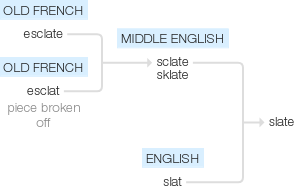Slate
Middle English sclate, sklate, shortening of Old French esclate, feminine synonymous with esclat ‘piece broken off’ (see slat).
wiktionary
From Middle English slate, slat, slatte, sclate, sclatte, from Old French esclate, from esclat (French éclat), from Frankish *slaitan(“to split, break”), from Proto-Germanic *slaitijaną, causative of *slītaną(“to cut up, split”). Doublet of éclat.
From Middle English slatten, sclatten, from the noun (see above).
etymonline
slate (n.)
mid-14c., from Old French esclate, fem. of esclat "split piece, splinter" (Modern French éclat; see slat), so called because the rock splits easily into thin plates. As an adjective, 1510s. As a color, first recorded 1813. Sense of "a writing tablet" (made of slate), first recorded late 14c., led to that of "list of preliminary candidates prepared by party managers," first recorded 1842, from notion of being easily altered or erased. Clean slate (1856) is an image from customer accounts chalked up in a tavern.
slate (v.)
1520s, "to cover with slates" (earlier sclatten, late 15c.), from slate (n.). Meaning "propose, schedule" is from 1883; earlier "to nominate" (1804); the notion is of writing on a slate board. Related: Slated; slating.
